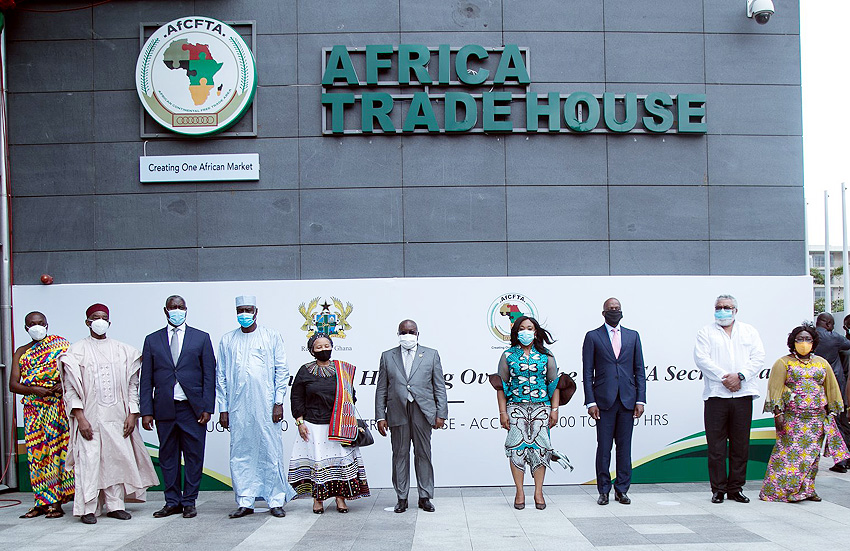The African Continental Free Trade Area (AfCFTA) agreement was initially scheduled to enter into force in July 2020. As a result of the COVID-19 pandemic, the commencement of the implementation of the continental deal has been postponed until January 2021. NJ Ayuk*, international legal practitioner and founder of one of Africa’s most successful law chambers, explains why the global health crisis presents AfCFTA an opportunity to fulfil its promise for a more prosperous continent
—–
The COVID-19 pandemic has had a severe impact on all African economies. According to the World Bank biannual Africa’s Pulse report, due to the pandemic, economic growth in sub-Saharan Africa will decline from 2.4% in 2019 to between -2.1% and -5.1% in 2020, wherein the region will experience its first recession in 25 years.
Whilst Africa has been excited and geared up for the July 2020 commencement of the African Continental Free Trade Area (AfCFTA), the much awaited kick off has had to be postponed to January 2021. This is because the main priority for most African States at the moment is to fight the COVID-19 pandemic and save lives. Additionally, negotiations on pending matters such as rules of origin, tariff reductions and services schedules have slowed down as negotiating teams are unable to travel due to the closure of borders and other lock down restrictions.

As the famous saying by Albert Einstein goes, “in the midst of every crisis, lies great opportunity.” There’s no doubt that although the COVID-19 pandemic has created a global crisis, it has also created a great opportunity for the AfCFTA to strengthen and re-configure intra-African supply chains, enhance resilience, improve infrastructure and health systems as well as reduce reliance on non-African trading partners. Furthermore, Africa should use this opportunity to expedite the establishment of regional value chains that will boost intra-Africa trade as well as accelerate negotiations on important sectors such as e-commerce, competition, intellectual property and investment.
Africa’s high dependence on non-African trading partners for ‘essential products’ during the pandemic has revealed the critical need for Africa to diversify its economies and strengthen the strategic sectors such as healthcare and agriculture. Two-thirds of African States remain indeed net importers of food and medicine. The global trade restrictions, disruption of the international supply chains and cross-border blockages caused by the pandemic have created shortages and an increase in the cost of essential products. Had the AfCFTA already been fully functional, African States would have been less reliant on international supplies.
One of the main objectives of the AfCFTA is to abolish tariffs on 90% of goods. As the tariff negotiations are yet to be finalized, State Parties could use this opportunity to include, “essential products” in their tariff schedules to avoid high dependence on non-African countries.
Further, the AfCFTA contains annexes on trade facilitation, customs cooperation, and transit that put in place infrastructure to facilitate cross-border trade, on which trade corridors could easily be established. If implemented, the annexures would improve access to products essential to respond to the current and future pandemics. The establishment of a Sub-Committee on Trade Facilitation, Customs Cooperation and Transit, which has the mandate to oversee the implementation and facilitate coordination of customs processes, includes the expedient delivery of essential products across the continent.

The AfCFTA will render Africa more resilient to respond to future public health crises as the effects of pandemic have accentuated the significance for Africa to build resilience and reduce its reliance on international supply chains for critical products and services. COVID-19 is expected to cause a shift from global supply chains towards more regionalized and localized ones that are more dispersed and diversified.
READ ALSO Ghana’s President Akufo-Addo commissions Africa Trade House in Accra
Africa can use its comparative advantage in its rich agricultural resources by improving basic infrastructure and efficiency, and agro-processing capacity. Resources will also be needed to strengthen the public health sectors, with the support of development partners and investors. States should thus re-balance their over-reliance on overseas suppliers in favour of more proximate suppliers within the African region.
The pandemic underlined the importance of the Fourth Industrial Revolution, specifically the need for digitalization of intra-African trade. Consequently, it has given Africa an opportunity to accelerate e-commerce and promote a digital economy in services such as banking, retailing, and public services. E-commerce is critical for economies not to collapse as it not only allows businesses to continue to operate but enables consumers to access essential goods and services during such crises.
The implementation of e-commerce could also lead to downward pressure on inflation through increased competition and cost savings. Thus it is key that the negotiations on telecommunications services in Phase III on e-commerce be concluded speedily and ensure that an enabling environment is created for the establishment of e-commerce and digital economies.
It is also very critical for Phase II of the negotiations that deal with protocols on investment, competition, and intellectual property to be given priority and be concluded as soon as possible. Once they have been fully concluded, Africa will be more attractive to investments and innovations especially in critical areas such as medical facilities, supplies and pharmaceutical products and public health sector.
African States must consider how trade can support public health. For example, investigating how the AfCFTA could promote the establishment of an African generic medicine industry, like that of India which has been a huge success.
The principle of transparency is a key principle of the AfCFTA, it states that State Parties publish and promulgate measures that relate to trade matter. This application of this principle will assist leaders in coordinating and collaborating on a continent-wide response to this COVID-19 pandemic or any other future crisis.
In conclusion, for Africa to fully benefit from the AfCFTA and boast intra-African trade, African leaders must take advantage of the shortcomings revealed by the pandemic by re-looking at and re-structuring key sectors that were most affected by the pandemic. It is also important for States to come together and work in a coordinated manner to accelerate the implementation of the AfCFTA.
——
* NJ Ayuk is the CEO of Centurion Law Group, a pan-African legal and advisory conglomerate with its headquarters in South Africa and offices in Equatorial Guinea, Ghana, Cameroon and Mauritius. His experience includes advising major companies on investment strategies, the establishment of joint ventures and cooperation structures, privatisation, licensing and related tax matters, OHADA law, oil and gas, power, local content development, litigation, contracts negotiation, governance and other matters pertaining to Africa’s energy sector
 THE AFRICAN COURIER. Reporting Africa and its Diaspora! The African Courier is an international magazine published in Germany to report on Africa and the Diaspora African experience. The first issue of the bimonthly magazine appeared on the newsstands on 15 February 1998. The African Courier is a communication forum for European-African political, economic and cultural exchanges, and a voice for Africa in Europe.
THE AFRICAN COURIER. Reporting Africa and its Diaspora! The African Courier is an international magazine published in Germany to report on Africa and the Diaspora African experience. The first issue of the bimonthly magazine appeared on the newsstands on 15 February 1998. The African Courier is a communication forum for European-African political, economic and cultural exchanges, and a voice for Africa in Europe.


























